Now love yourself and enjoy this one ...
Eggs have always been a budget staple in my house, but in this economy? 😅 With the price of eggs increasing every day, I’m having to replace some of my usual go-to egg-heavy meals with eggless recipes. And since I know this egg-tastrophy is hitting everyone hard, I thought I’d round up some of my favorite egg-free Budget Bytes recipes to help make the shift a little less painful for everyone. So if you’re an egg lover like me and you need some satisfying alternatives until those egg prices come back down, hopefully, these egg-free recipe ideas will help!
And if this doesn’t satisfy your needs, you can always peruse our entire egg-free recipe library!
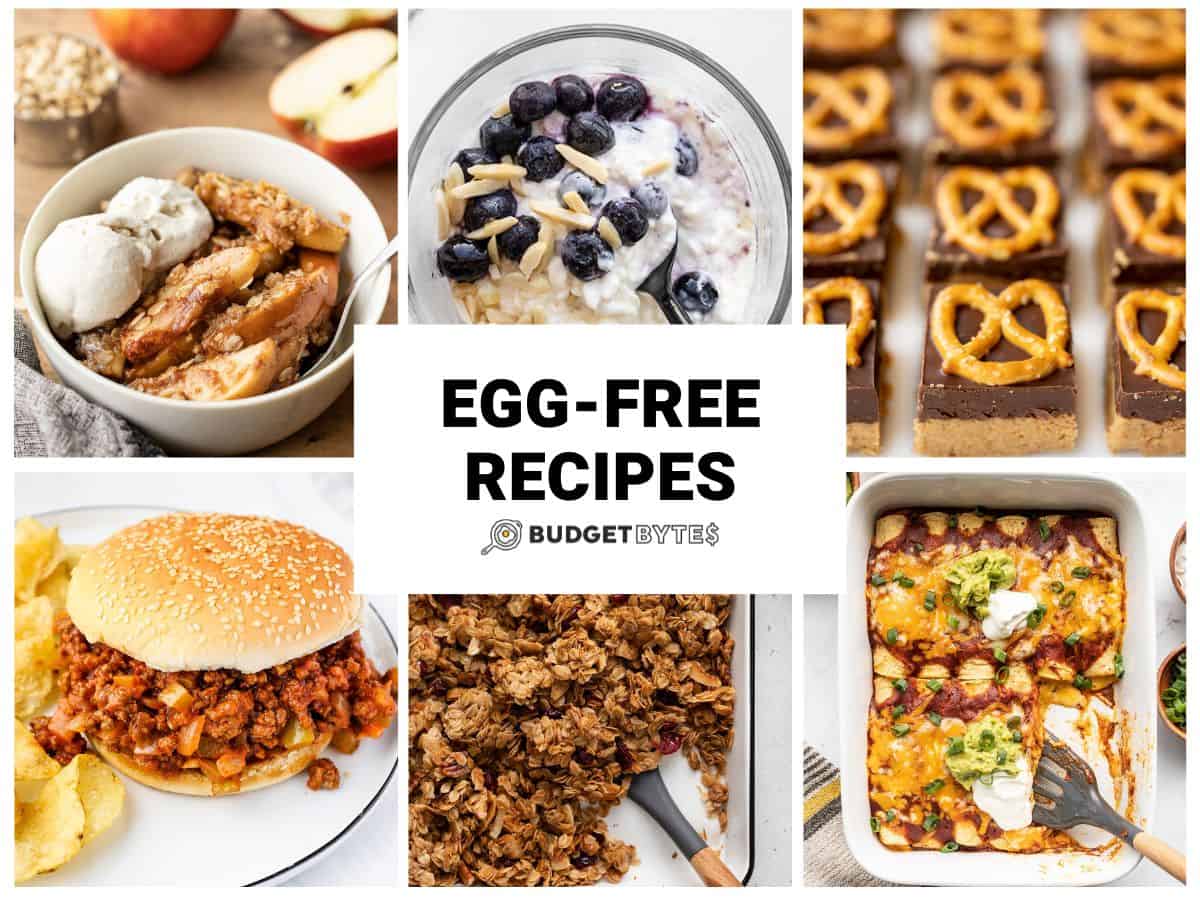
Egg-free Breakfast Ideas
I could happily eat eggs for breakfast every single day, but not at these prices! My usual eggstravaganza breakfast will have to wait. Here is what I’m enjoying for breakfast lately, instead of my favorite scrambles, omelets, and frittatas.
Homemade Granola
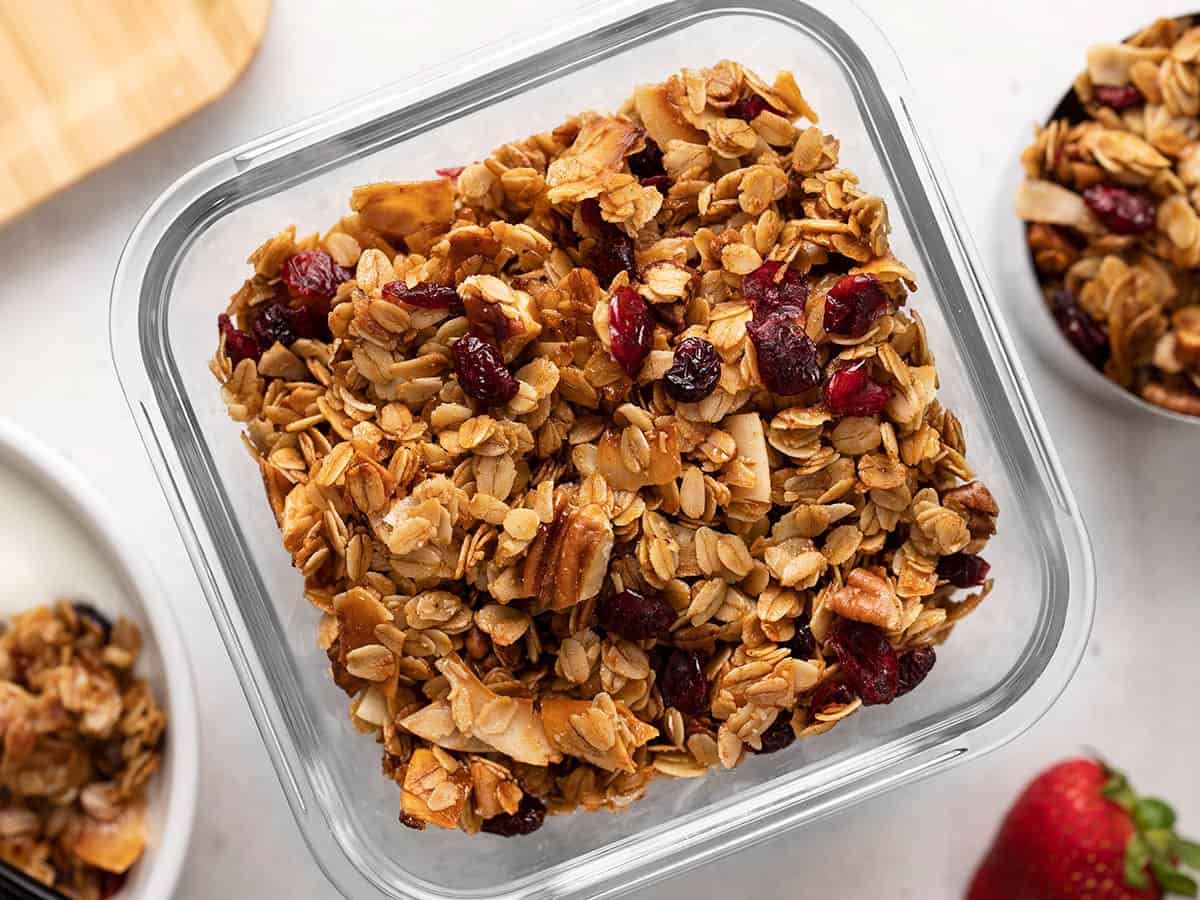
Homemade Granola - This homemade granola is really inexpensive, easy to make, versatile, and if you top it with some yogurt you’ve got a really filling breakfast, sans-egg!
Apple Pie Overnight Oats
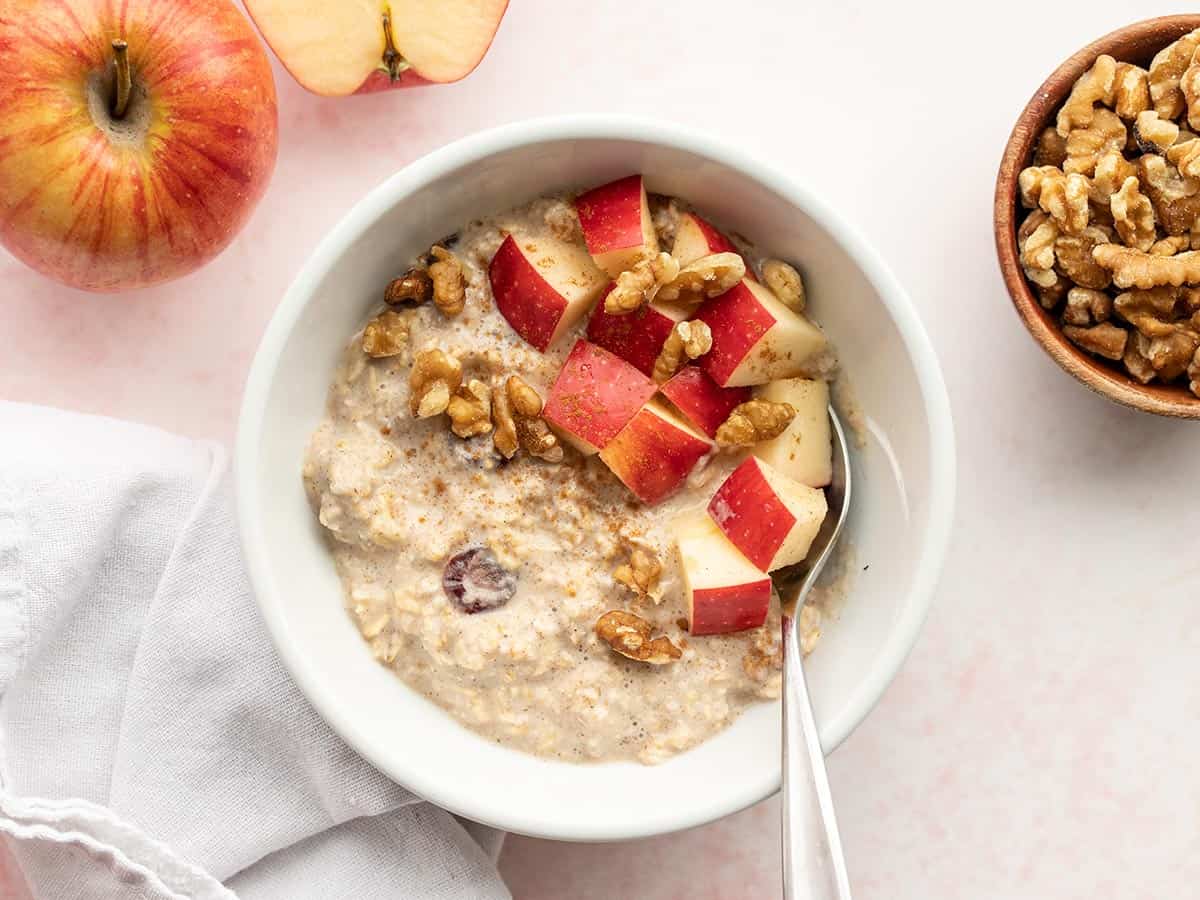
Overnight Oats - Overnight oats (any flavor) are another great easy breakfast option without eggs. You can toss in whatever fruit or nuts you have, or add some yogurt for extra protein!
Country Sausage Gravy
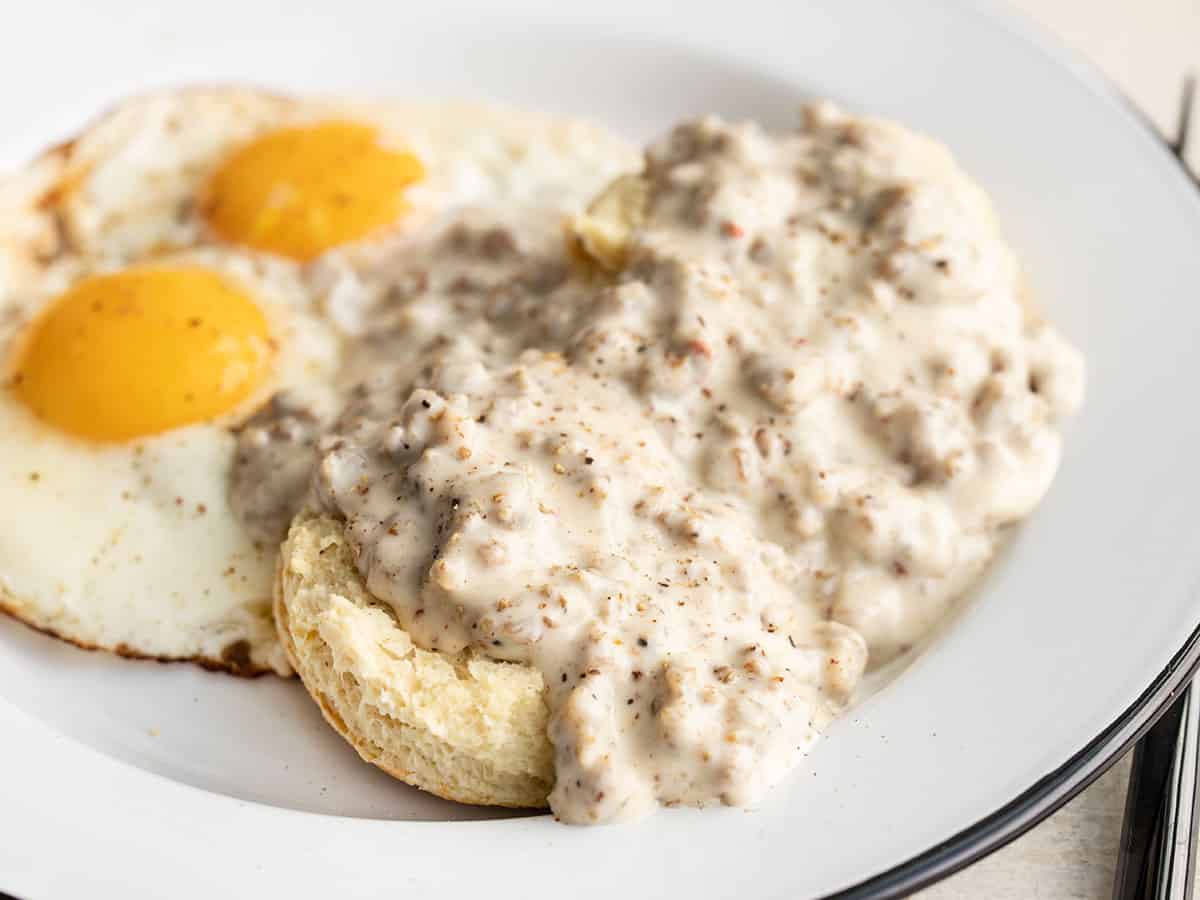
Country Sausage Gravy - I know I have these *pictured* with eggs, but you don’t need any eggs to make the gravy and you certainly don’t have to serve it with eggs on the side! Make some homemade biscuits and bacon to go along with your gravy and you’re set!
Lemon Berry Yogurt Breakfast Bowls
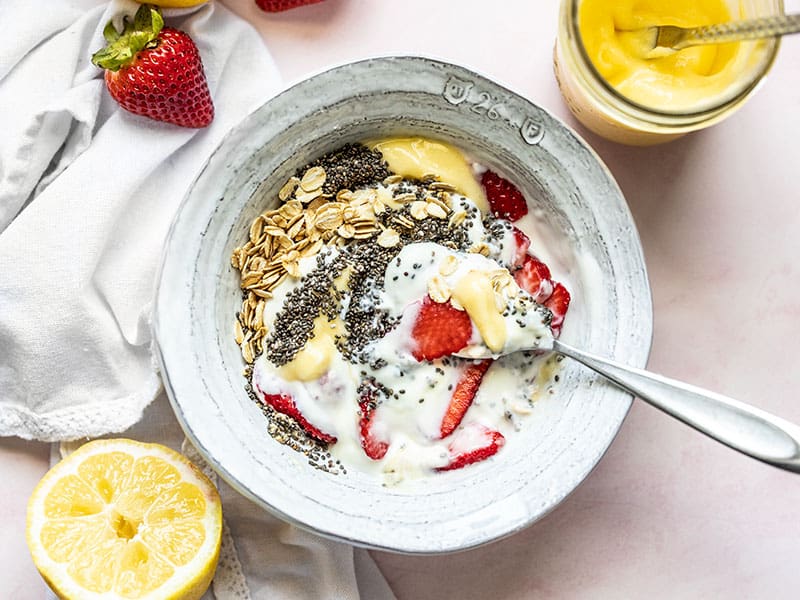
Yogurt Bowls - Top a bowl of yogurt with just about any fruit, nut, seed, grain, or a dollop of jam or jelly. (The version pictured does have lemon curd, which contains eggs, but you can replace it with any flavor of jam, jelly, or preserves.)
Ham and Cheese Biscuits
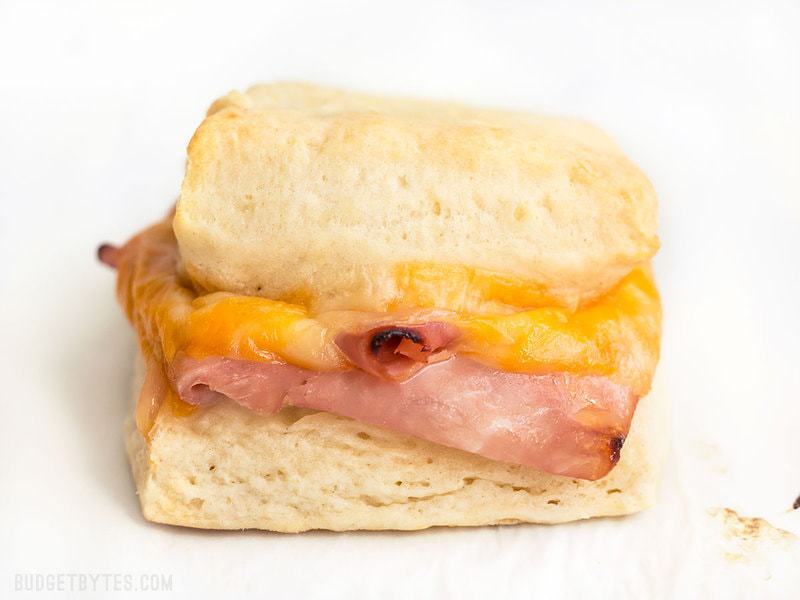
Ham and Cheese Biscuits - It’s just like your favorite breakfast sandwich, minus the egg! Still totally hearty, delish, and the perfect handheld meal for on-the-go.
Chocolate Coffee Breakfast Smoothie
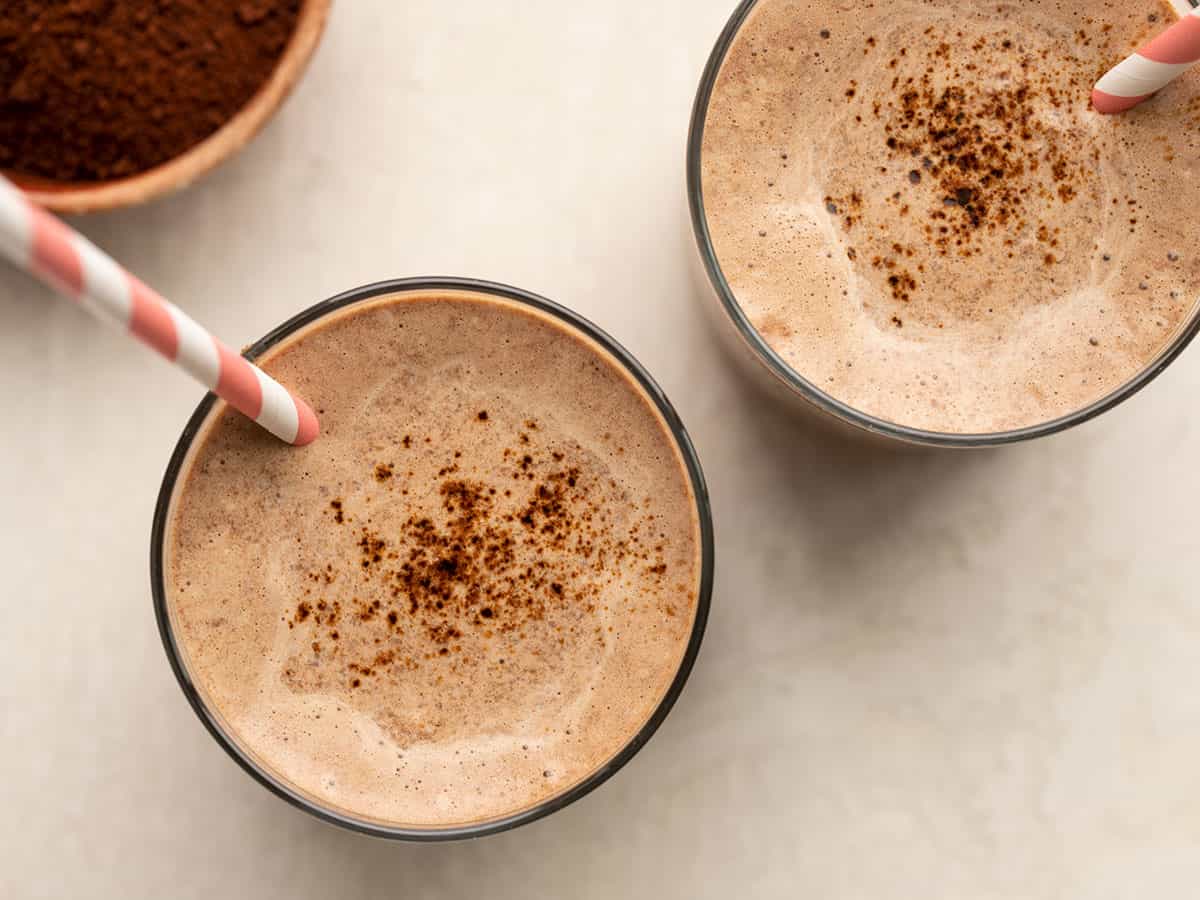
Smoothies - Smoothies are a great egg-free breakfast option. I love the chocolate coffee flavor linked above (it tastes like a Wendy’s frosty!), but there are so many options when it comes to smoothies. :)
Savory Oatmeal
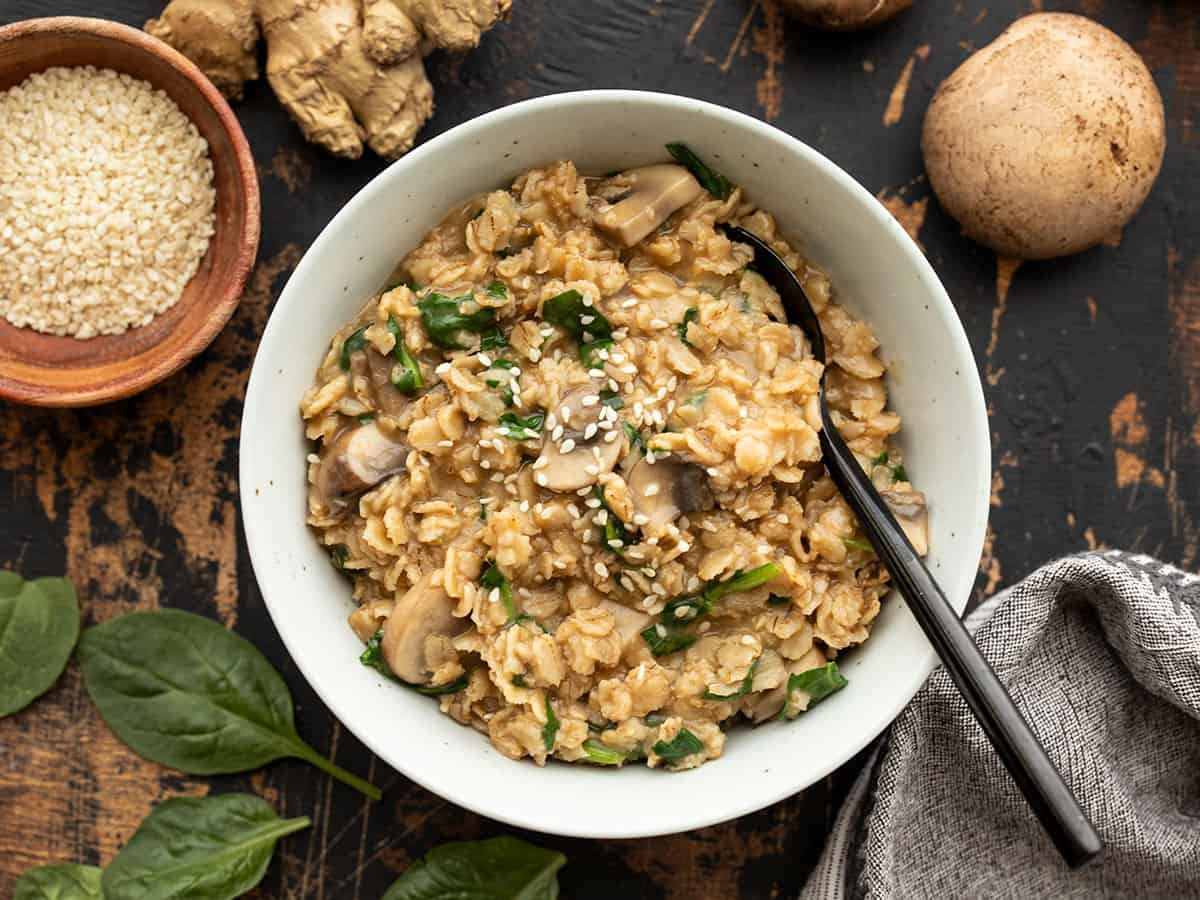
Savory Oatmeal - For all my savory breakfast lovers out there, you’ve got to try savory oats! Load ’em up with veggies and other umami-filled ingredients and you won’t even miss your morning eggs. Promise! (And when egg prices come back down, you can add one to your bowl.)
Blueberry Almond Cottage Cheese Breakfast Bowl
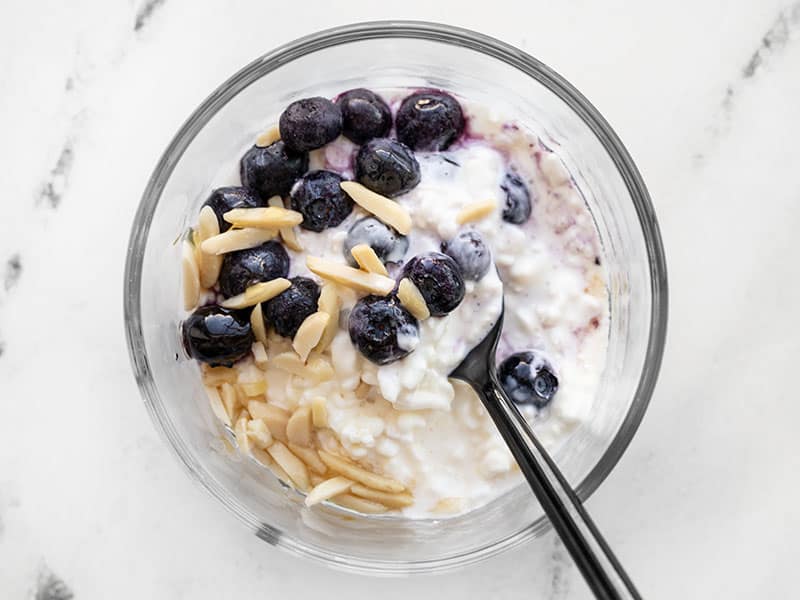
Cottage Cheese Breakfast Bowls - Cottage cheese also makes a really great base for a breakfast bowl and there are so many topping options! Head over to the blog post to see this blueberry almond version, plus five other flavor combos!
Egg-Free Baked Goods
Baked goods like cakes, cupcakes, scones, and muffins often use eggs to help keep the crumb sturdy, but eggs aren’t always necessary. Here are a few of our favorite egg-free baked goods for you to enjoy until those egg prices come back down!
Cranberry Orange Cream Scones

Cranberry Orange Cream Scones - These tender two-bite scones use the magic of heavy cream to keep the crumb soft and rich without using any egg in the process. They’re easy and absolutely irresistible!
Easy Soda Bread
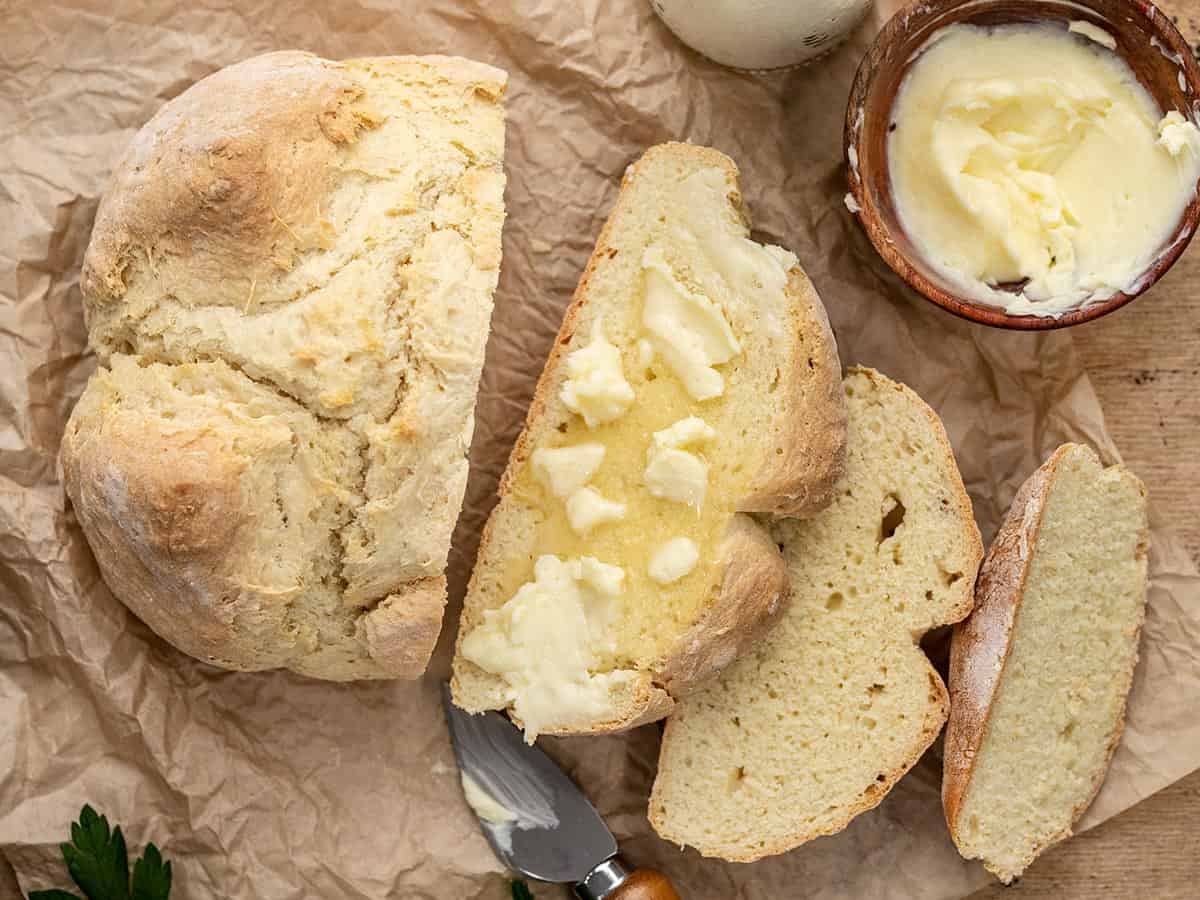
Easy Soda Bread - This super simple bread is a fool-proof homemade bread for beginners. Just a few ingredients (and NO eggs), makes you a really hearty loaf that’s perfect for slathering with butter and jam, or dipping into your favorite soup.
Cheddar Drop Biscuits
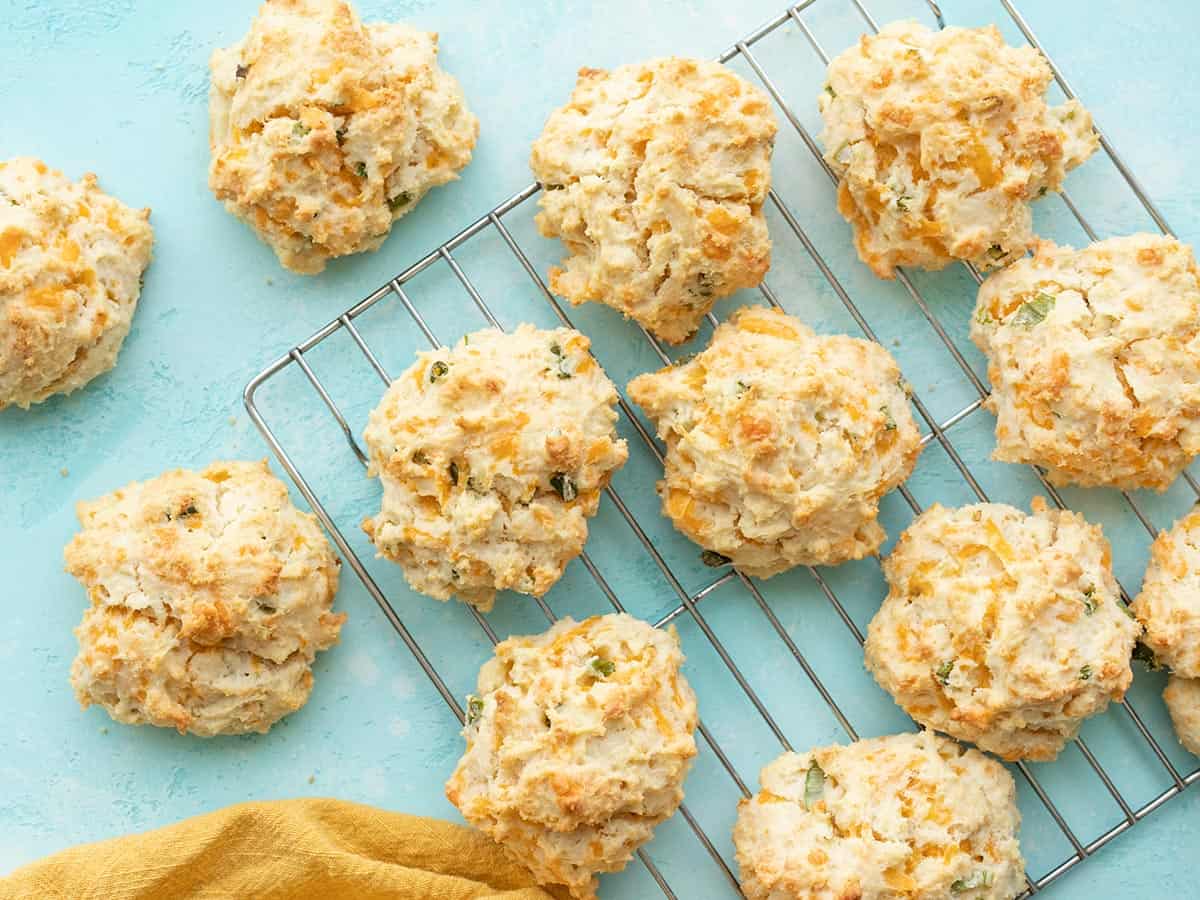
Cheddar Drop Biscuits - These super easy biscuits make the perfect side for any dinner. They’re savory, rich, and soooo buttery!
Cinnamon Nut Swirl Mug Cake
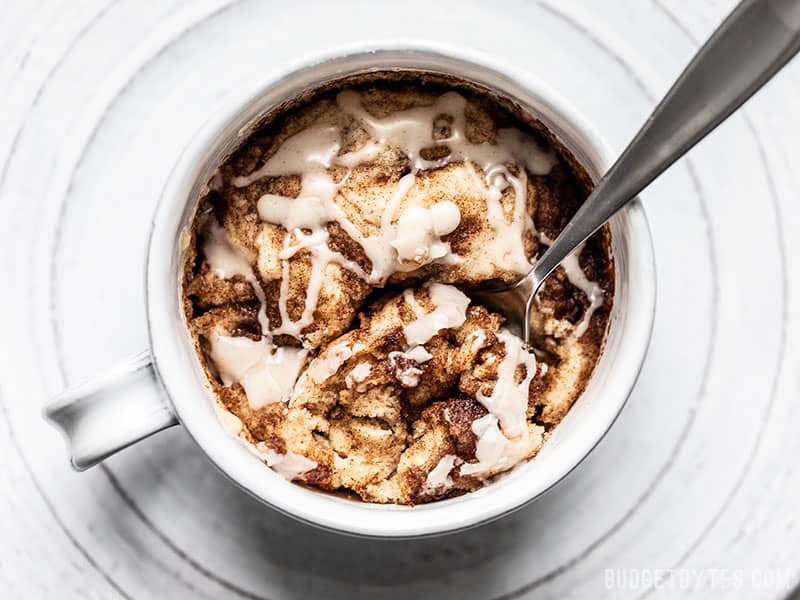
Cinnamon Nut Swirl Mug Cake - It’s like a single-serving cinnamon roll, but made in a mug! And in the microwave! …Without any eggs!
Chocolate Depression Cake (No Eggs, Butter, or Milk)
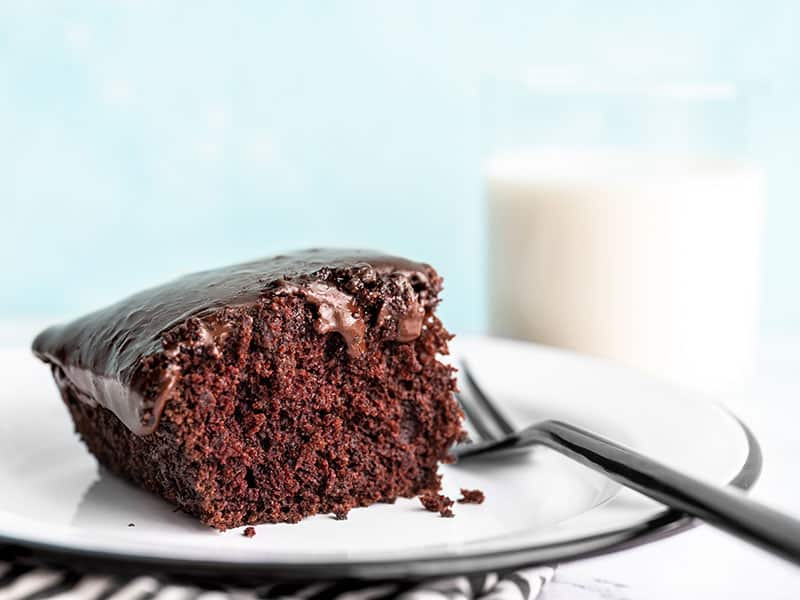
Chocolate Depression Cake - Eggs were also really expensive during the Great Depression, so people made this super simple chocolate cake that is still moist and delicious even without using any eggs (or dairy)!
Sweet Potato Biscuits
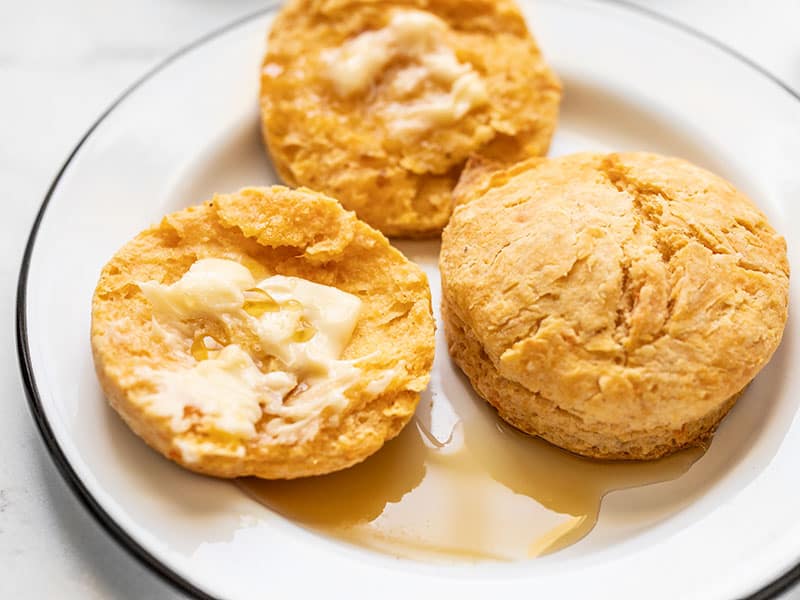
Sweet Potato Biscuits - This really fun spin on biscuits uses mashed sweet potato to give the biscuits extra moisture, flavor, and a really fun orange color! …And not an egg in sight!
Egg-Free Dessert Recipes
A lot of desserts tend to use eggs as well because that glorious yolk provides a lot of richness. But there are still plenty of eggless options when it comes to curing your sweet tooth. Here are some of our favorite egg-free desserts.
Rice Krispie Treats
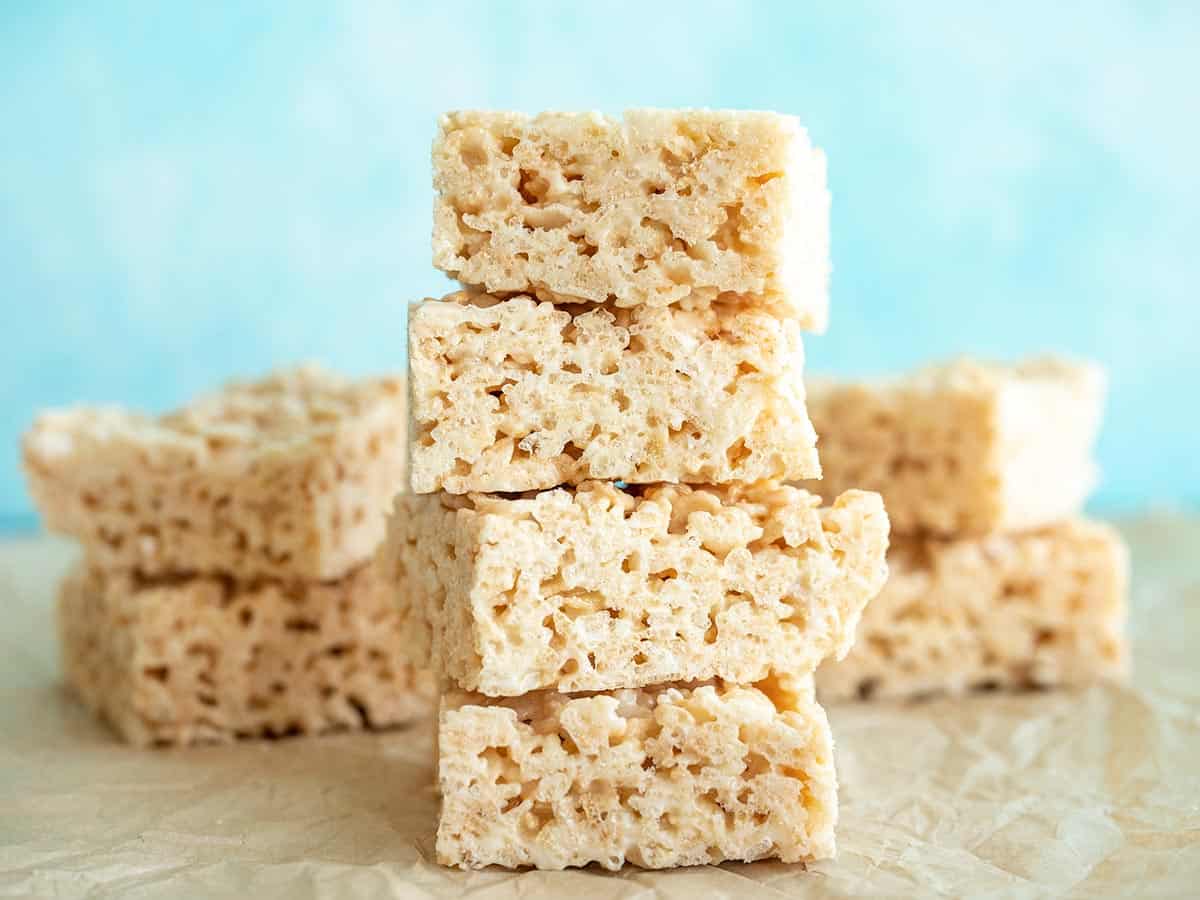
Rice Krispie Treats - Rice krispie treats are one of the easiest desserts you’ll ever make, and they’re plenty rich, even without eggs, thanks to a generous helping of butter.
Easy Lemon Cream Pie
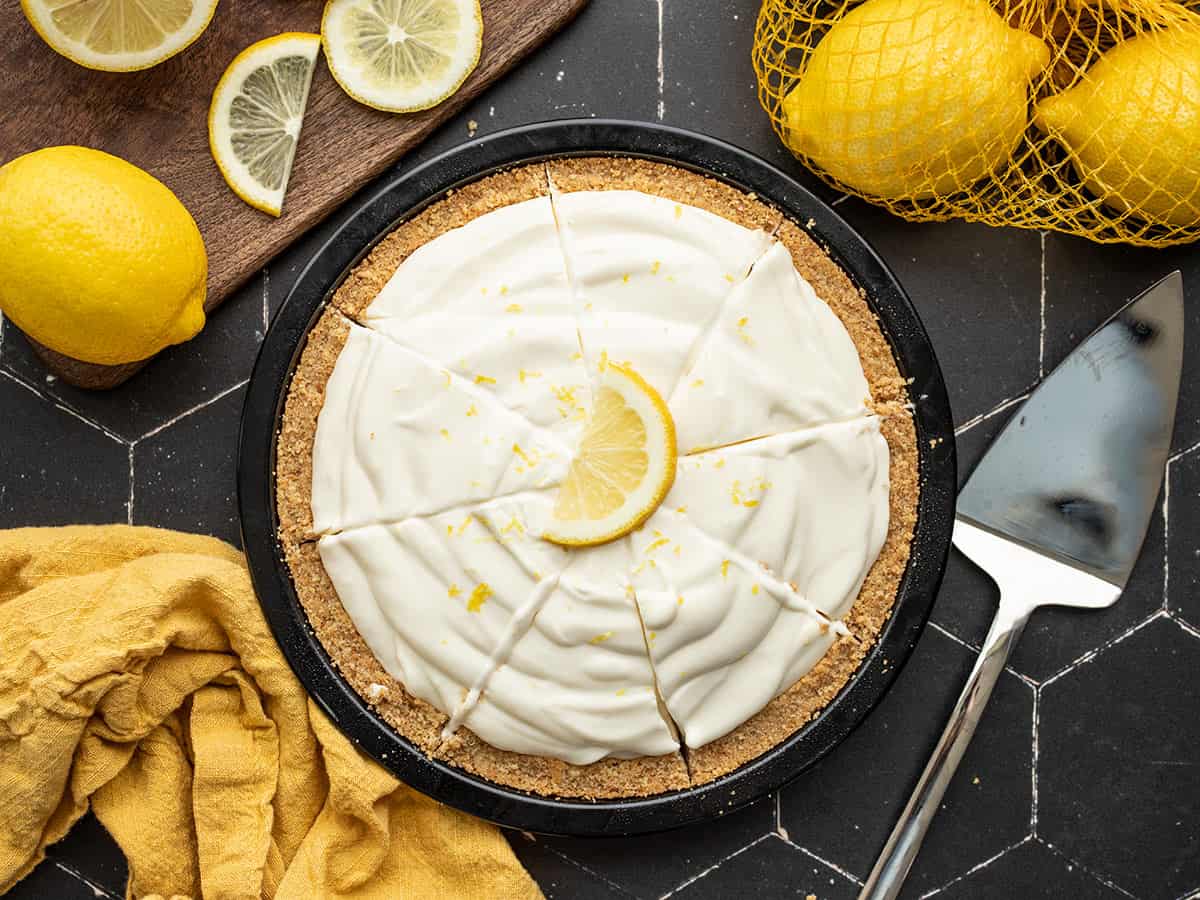
Lemon Cream Pie - This deliciously light and fluffy lemon cream pie is another deceptively simple dessert that requires only a few simple ingredients, none of which are eggs. ;)
No Bake Pretzel Peanut Butter Bars
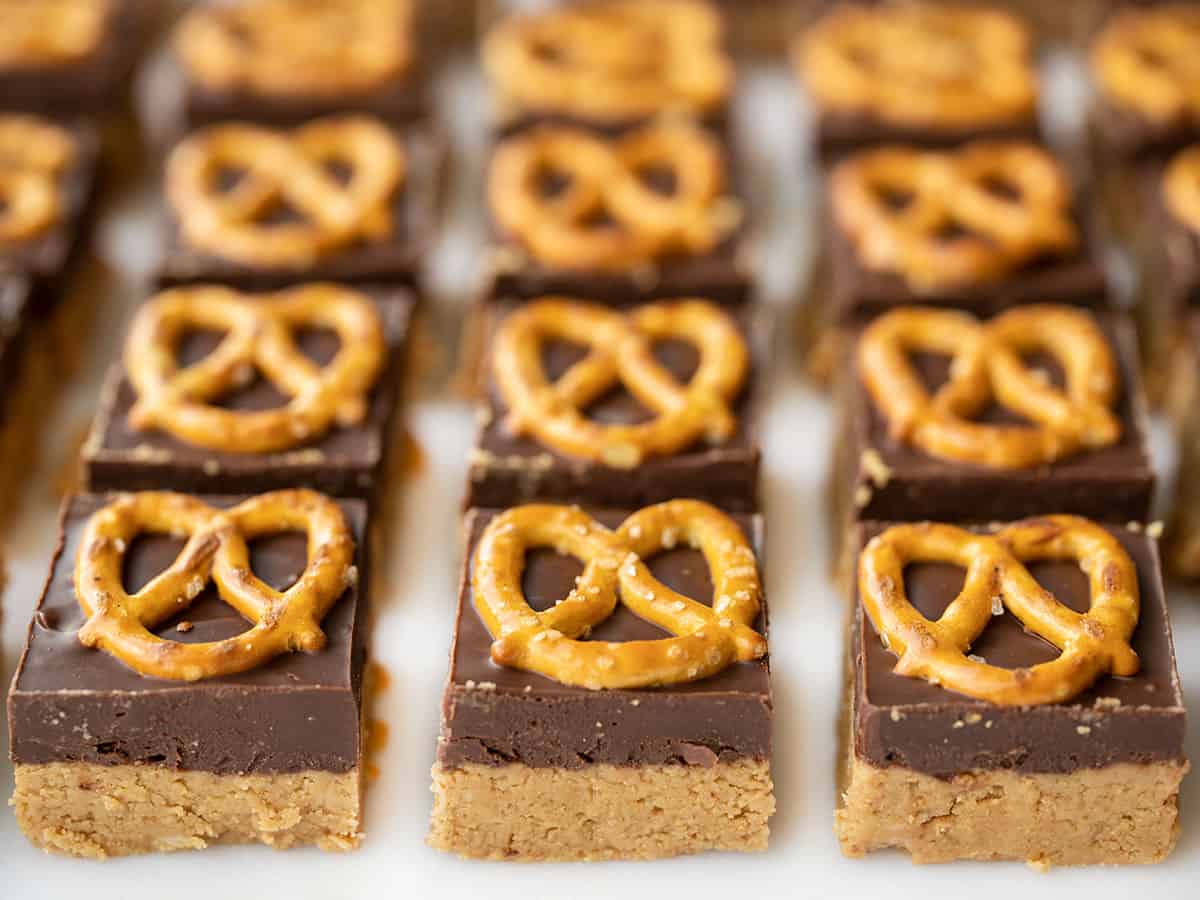
Peanut Butter Pretzel Bars - These addictive little bars have a super rich base (thanks to peanut butter), a sweet chocolate topping, and then the perfect little salty crunch to balance it all out. DIVINE.
Raspberry Oatmeal Bars
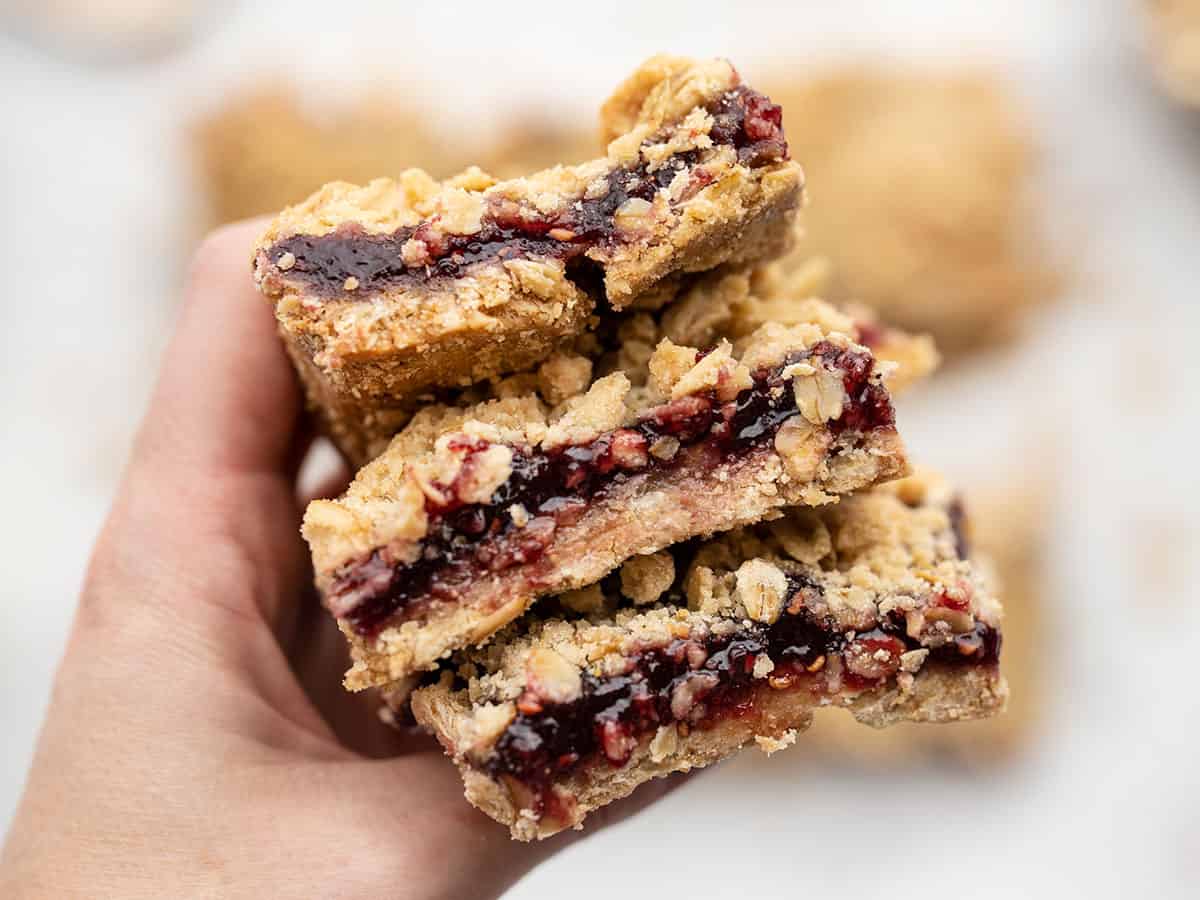
Raspberry Oatmeal Bars - If you need a quick sweet-tooth-fix, you probably already have the ingredients for these oatmeal bars in your fridge! The jam acts as the “glue” that holds the bars together, so no egg needed!
Easy Apple Crisp
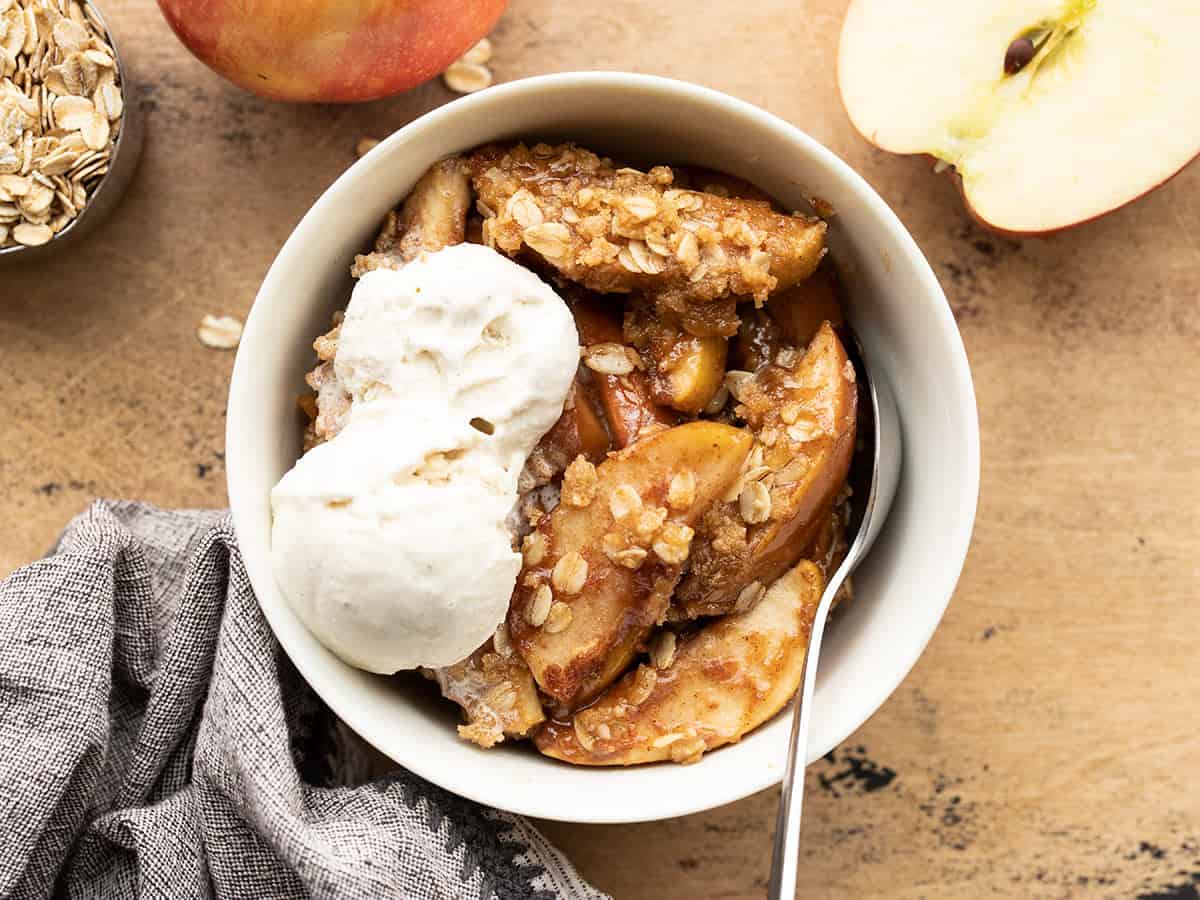
Apple Crisp - Apple crisp, or any fruit crisp are really simple desserts that require no eggs. It’s just lightly seasoned fruit baked down until it’s soft and delicious, topped with a sweet, crispy, and buttery crumble topping. So easy!
Egg-Free Dinner Ideas
There are TONS of dinner recipes that don’t require eggs, so you can peruse our Egg-Free Category page to see the full library of recipes. But I’ll highlight just a few of my favorites for you here!
Creamy White Chicken Chili
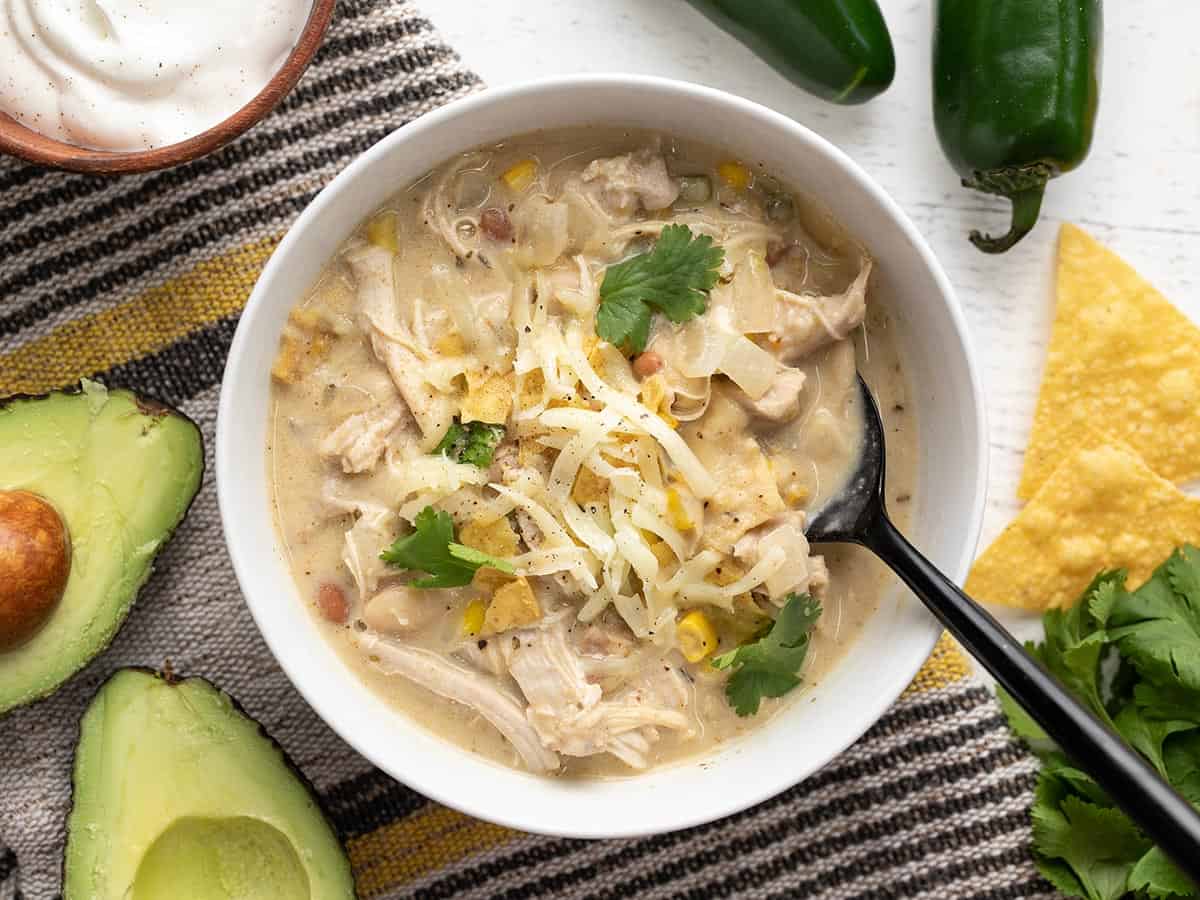
Creamy White Chicken Chili - This chili is so rich and delicious that it will make you forget all of your egg woes (and maybe all the other problems in the world).
Sloppy Joes
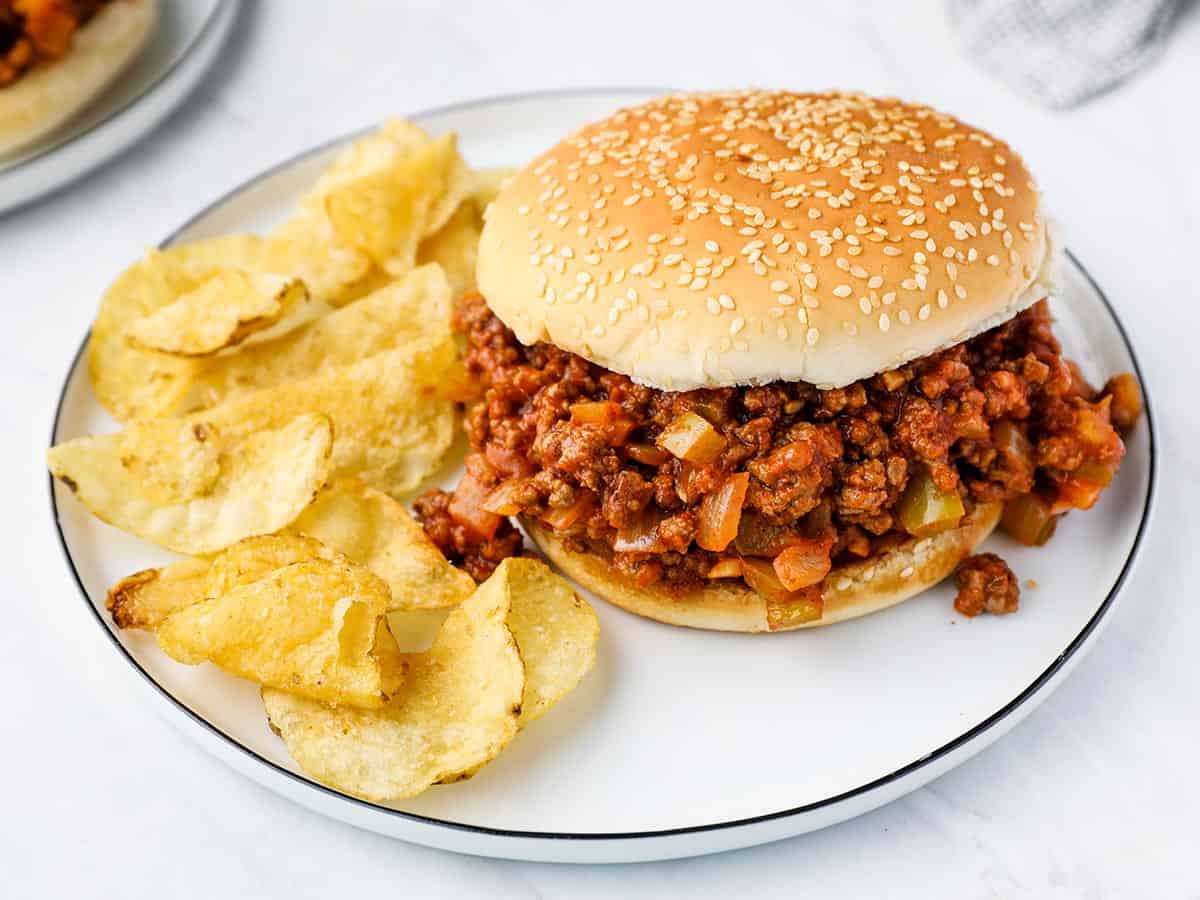
Sloppy Joes - Sloppy joes are such a quick classic! Bonus, you can sub half the beef for lentils to make them even more budget-friendly (see Sloppy Joes Plus for instructions).
One Pot Chicken and Rice
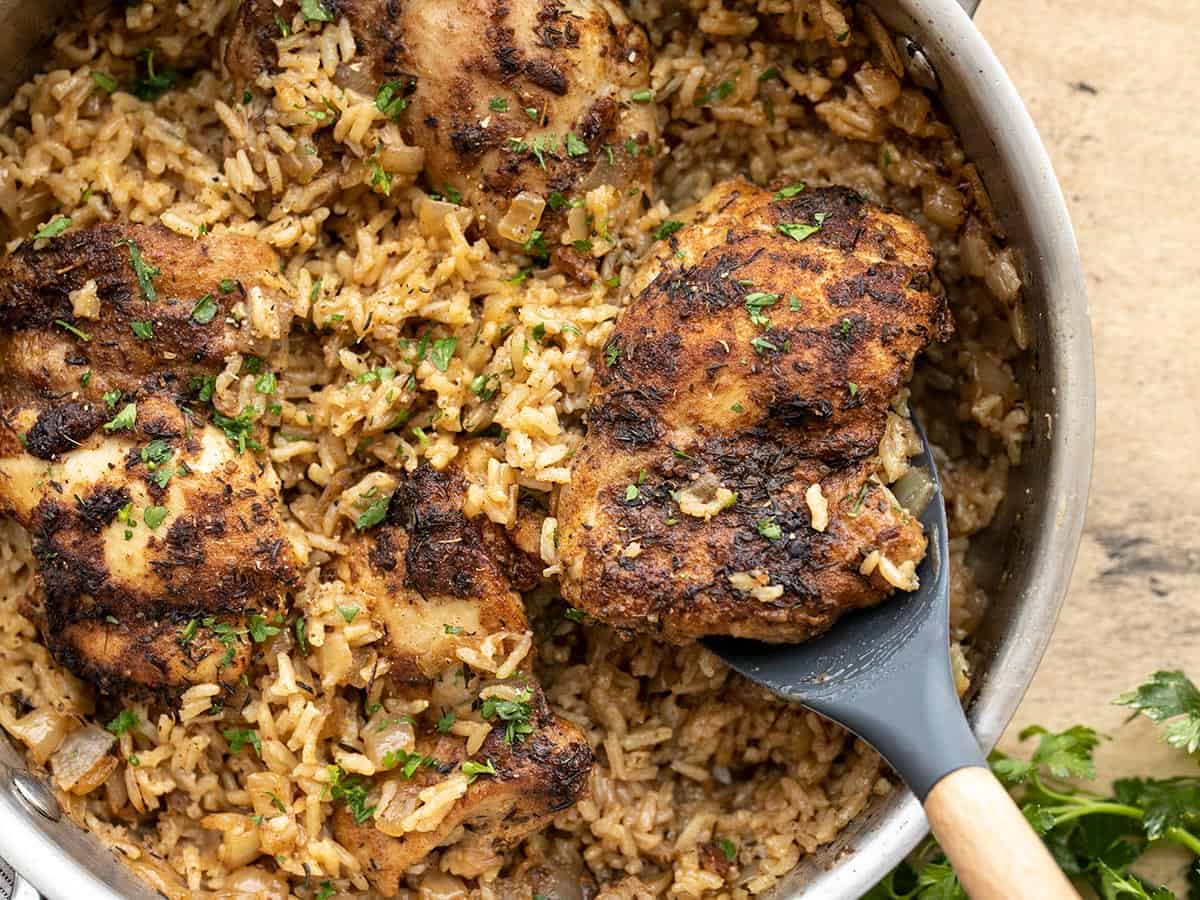
One Pot Chicken and Rice - You’ll never make plain rice as a side dish for dinner again after you try cooking it together in the pot with juicy chicken thighs and a hefty dose of herbs and spices.
Cheesy Pinto Beans
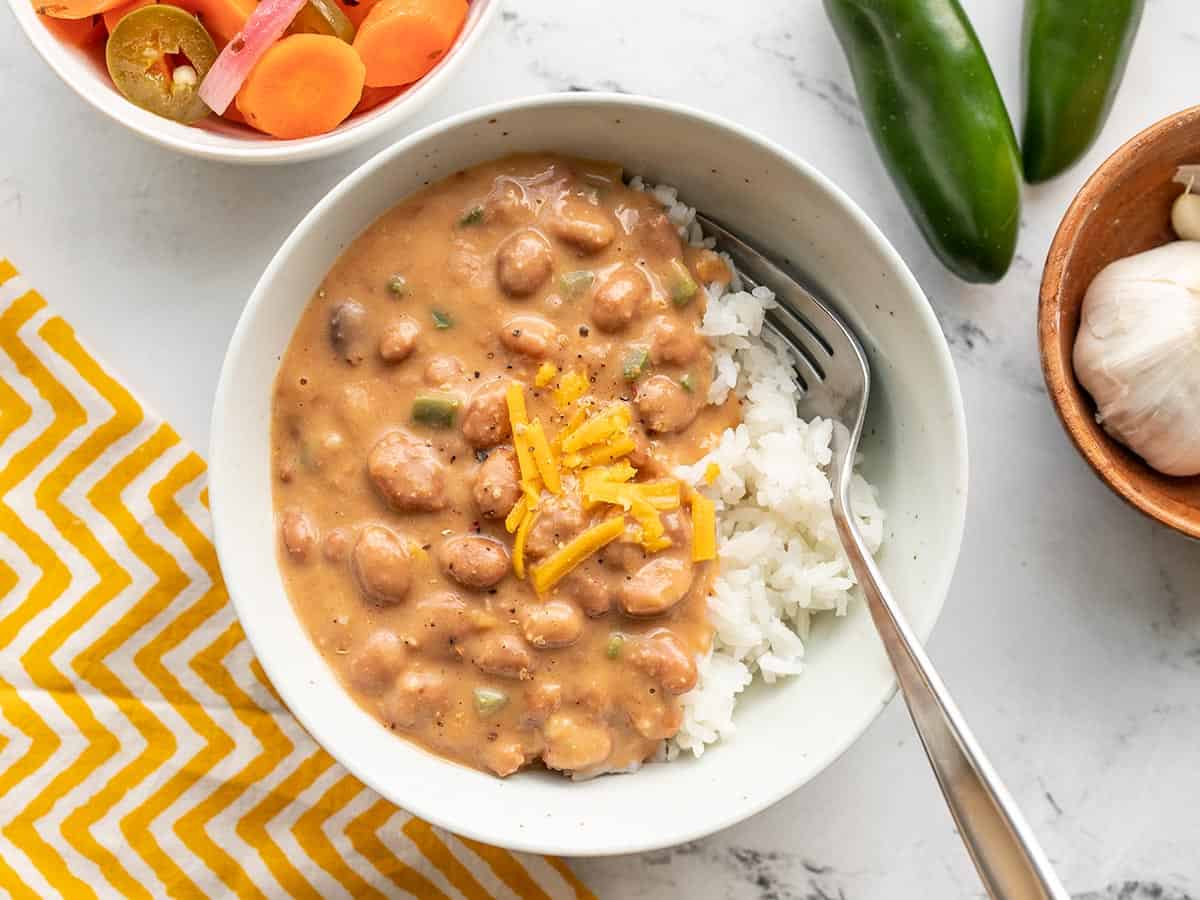
Cheesy Pinto Beans - If you’re looking for something easy, and I mean EASY, these cheesy pinto beans are it. Cheddar cheese adds all the richness you’d normally get from egg yolks and the beans & rice combo will take care of all your protein needs.
Sheet Pan Kielbasa Potatoes and Green Beans
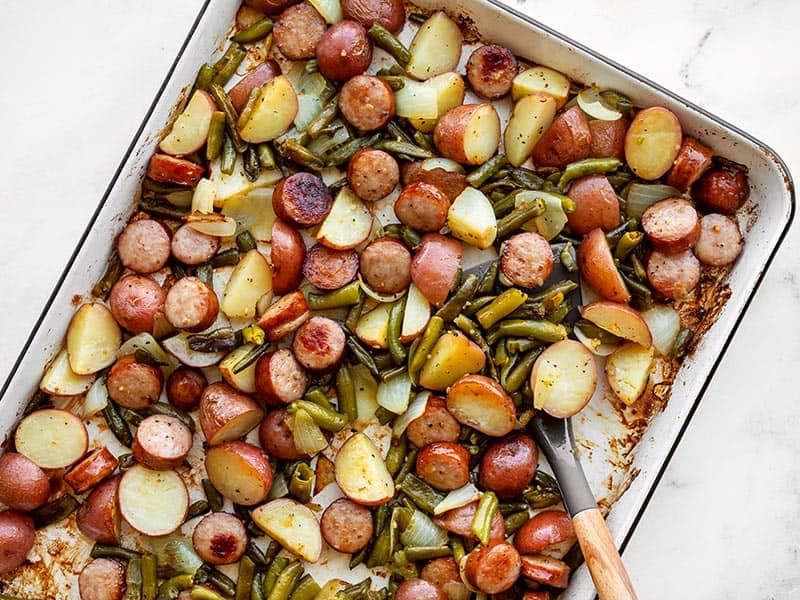
Sheet Pan Kielbasa, Potatoes, and Green Beans - This is probably the easiest sheet pan meal I’ve ever made, and one of my favorites (flavor-wise). It’s just too simple and too good to miss!
Cheese Enchiladas

Cheese Enchiladas - Melting cheese in a tortilla was my go-to snack when I was growing up (…okay, maybe still to this day), so these cheese enchiladas are like an elevated meal-worthy version of that simple snack! So good!
What Recipes have you been leaning on lately to replace your recipes with eggs? Let us know in the comments!
The post Egg Free Recipes appeared first on Budget Bytes.
By: Beth - Budget BytesTitle: Egg Free Recipes
Sourced From: www.budgetbytes.com/egg-free-recipes/
Published Date: Fri, 27 Jan 2023 17:19:16 +0000
Frequently Asked Questions
Should You Use Herbs and Spices for Brain Health?
Herbs and spices have been used for centuries to improve brain health. Research shows that these natural remedies may help prevent dementia and Alzheimer's. Some herbs may even boost memory.
However, no scientific evidence proves that eating an herb-rich diet can keep your mind sharp. When it comes to improving cognitive function, there are more effective ways to do it.
One study found that older adults who took 1000 mg of vitamin B6 daily had fewer mental lapses than those taking placebo pills. Another study showed that drinking coffee could increase blood flow to the brain. Other studies suggest that exercise, socialization, and sleep improve brain health.
The bottom line is that herbs and spices probably won't make much difference to your overall health. But they might give you extra energy and focus, which can come in handy during the day.
Is eating raw basil good for you?
I'm sure everyone knows that fresh herbs are great for cooking but did you know that you could eat them too? Raw, uncooked herbs are packed full of nutrients and vitamins that we normally have to cook.
They contain more antioxidants than any fruit or vegetable. And they also help our immune systems stay strong and healthy.
The best way to enjoy these delicious little green gems is to eat them raw from the garden. But there's nothing wrong with enjoying them cooked, either. They taste even better when sautéed in olive oil and served alongside pasta or rice.
There are lots of ways to incorporate raw herbs into recipes. Add them to salads, soups, sandwiches, wraps, omelets, stir-fries, and pesto.
Just make sure you wash them well first!
What is the mother of all herbs?
The answer may surprise you!
It is a common garden herb known as rosemary (Rosmarinus officinalis). Rosemary has long been associated with fertility, longevity, and protection from illness. In some cultures, it was believed that the fragrance of rosemary could ward off evil spirits.
As such, it has been used for centuries in various medicinal, culinary, and spiritual applications. Rosemary has a unique flavor that pairs well with many dishes, making it a popular choice in the kitchen. Its fragrant leaves also add flavor to sauces, herbs, and meats.
Rosemary is a powerful medicinal herb used throughout the centuries to treat various ailments. Rosemary essential oil can treat respiratory tract infections, digestion problems, skin irritation, and inflammation. Its anti-inflammatory properties make it helpful in treating headaches and muscle pain as well. In addition, the oil has been used to improve cognitive function and memory recall. Rosemary can also be taken as a supplement, tea, or tincture for its many benefits.
It's no wonder rosemary is known as the mother of herbs! It truly is a versatile and valued herb.
Is it okay to use dried herbs instead of fresh ones?
It is best to pick up fresh herbs whenever possible when using herbs.
Although dried herbs are convenient, they don’t provide the same benefits as fresh herbs.
Fresh herbs contain essential oils that give your food a unique flavor. These oils help preserve the nutrients within the herb.
Dried herbs lose all their flavor after drying, so they cannot replace fresh herbs.
You should only use dried herbs if you absolutely must. Otherwise, you should get your fresh herbs from the market.
How is basil used for medicinal purposes?
In ancient times, doctors would prescribe basil leaves to treat colds and coughs. Today, basil contains powerful anti-inflammatory properties, making it an ideal remedy for arthritis, asthma, bronchitis, eczema, gout, hay fever, indigestion, migraines, menstrual cramps, sinus infections, sore throats, ulcers, varicose veins, and more.
Basil is also known for its ability to help protect against cancer, heart disease, diabetes, skin conditions, and even aging.
Basil is often referred to as "the herb of grace" because it helps us relax and unwind after stressful situations. It is also said to improve memory and concentration, boost energy levels, increase libido, and enhance athletic performance.
The list goes on and on. Basil is a versatile plant that offers a wide range of benefits for our health and well-being.
What herb is best for healing?
Herbs are a fantastic way to help heal our bodies. Herbal medicine has been used since ancient times and continues to grow today. There are thousands of herbs known to cure various ailments.
Some herbs are excellent for treating colds and flu, while others can treat anxiety, depression, arthritis, cancer, diabetes, heart disease, and more.
There are also herbal remedies for skin care, hair loss, weight loss, sexual health, energy, sleep, digestion, and much more.
The list goes on and on. But one herb stands above them all regarding its ability to heal. That herb is called aloe vera.
Aloe Vera is considered to be the world's most powerful healer. For centuries it has helped people heal themselves naturally without any side effects.
It's incredible how well aloe vera works. It's even better than prescription drugs and surgery.
In addition to its natural healing properties, aloe vera is highly versatile and can be used in almost any area of life, including food, beauty products, and household cleaning supplies.
You may not realize this, but aloe vera contains hundreds of active compounds, which include vitamins A, C, E, B1, B2, B3, B6, folic acid, calcium, magnesium, iron, zinc, copper, sulfur, manganese, phosphorus, potassium, sodium, chloride, fluoride, iodine, selenium and more.
These nutrients are essential for human body functions such as cell growth, metabolism, immune system support, healthy bones and teeth, healthy blood pressure levels, healthy eyesight, healthy cardiovascular systems, healthy digestive systems, healthy lungs, healthy nervous system, healthy reproductive organs, healthy skin, and healthy libido.
Statistics
- Herbs are among the most popular and widely used medicinal remedies. According to a survey conducted by the National Institutes of Health, herbs were used by over 38% of adults in the United States.
- The global herbs market is expected to reach more than $125 billion by the end of 2025.
External Links
onlinelibrary.wiley.com
mskcc.org
- Ashwagandha | Memorial Sloan Kettering Cancer Center
- Grape Seed | Memorial Sloan Kettering Cancer Center
doi.org
sciencedirect.com
- Peppermint oil (Mintoil®) in the treatment of irritable bowel syndrome: A prospective, double-blind placebo-controlled randomized trial
- Curcumin reverses the effects of chronic stress on behavior, the HPA axis, BDNF expression, and phosphorylation of CREB
How To
How To Upcycle Herbs After Making Infusions, Oils, Tinctures, And More?
There are more ways to use herbs than you might realize. This is why it's essential to keep an open mind when learning how to make herbal infusions, oils, tinctures, and more.
You'll find that there are many methods for making these products, and even though they may seem similar, each method has its benefits.
For example, some methods include creating decoctions, boiling water or alcohol with the herb(s), and letting them simmer for a while. These infusions are solid and potent because they contain higher concentrations of active compounds.
Another type of infusion includes macerating the herb(s), which means soaking them in liquid for a few hours or even overnight. Macerations tend to produce milder results because the plant material isn't boiled.
Some cold-infused forms involve steeping herbs in cool liquids such as ice cubes or cold water. Cold infusions are gentler than hot ones, often used to treat minor ailments.
Herbal oil extraction involves heating the herb(s) to release the essential oils. You can either do this yourself or have someone help you out with it.
Finally, there are tinctures made by mixing herbs with alcohol. They're usually taken orally and are very effective for treating coughs, colds, and flu symptoms.
The best way to learn how to create infused products is to experiment with various techniques. Each technique offers a different potency and effectiveness, depending on the herb(s) you choose.
Once you've tried a few different methods, you'll begin to develop your preferences. In time, you'll be able to determine which techniques work well for you and which aren't worth pursuing.
.png)





